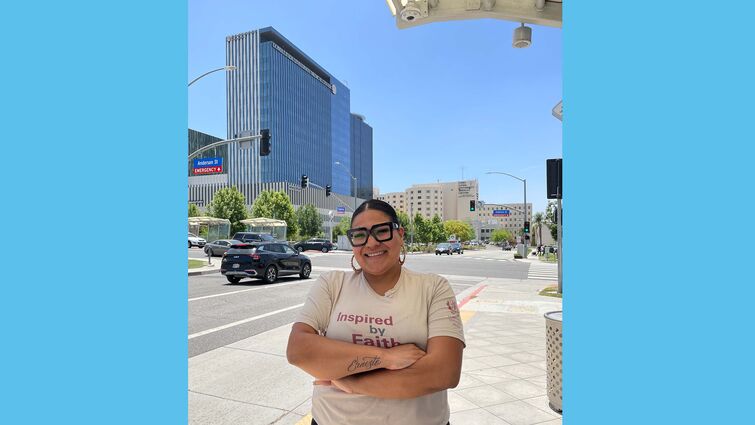
Every day, Community Health Worker Selina Pena walks past bus shelters and lawns near the Loma Linda University Medical Center Emergency Department to look for her patients. Many of them are “frequent utilizers” — patients experiencing homelessness who check in at the Emergency Department several times a week. Some check in several times a day.
Pena seeks out these patients where they are to offer tools and support. With some, it’s mental health issues and reminding them of follow-up outpatient appointments. With others, it’s a friendly “hello” and a supportive smile to show them someone cares.
Really, her job is to try to help them prevent visits to the Emergency Department, where avoidable check-ins add to an already long list of patients waiting to be seen and cost the hospital and public reimbursement programs hundreds or thousands of dollars each time. This all begins with relationship building.
Pena, 39, says she knows how many of them feel. She used to be homeless herself. After running away from home at age 14, she couch-surfed by staying with friends and wasn’t settled in a home until age 25. At that point, tired of her life circumstances and lack of opportunities, she went back to high school and graduated. She got sober and for years worked as a case manager at various facilities offering assistance and housing to those experiencing homelessness. She recently graduated from college with an associate’s degree, the first in her family to do so.
She can relate with her patients experiencing addiction, illiteracy, substance abuse, and alcohol dependency. She says many are like her—for so long she hadn’t known about resources and didn’t receive the help she needed from certain agencies.
Now she and her team round on their patients on sidewalks and when they’re in-patients in the Emergency Department, helping them with services they may need.
“I absolutely love what I do,” Pena says. “There are challenges working with this population, I’m not going to lie. But it’s a passion of mine to give people connection.”
Loma Linda University Health is employing two other Community Health Workers like Pena, as well as a licensed clinical social worker and nurse case manager, using the California Enhanced Care Management Medi-Cal benefit.
A $1.2-million grant is enabling the hospital to partner with certain patients who come to the Emergency Department to talk, or receive a blanket, or get a meal, and connect them with programs and resources that can address their social drivers of health. For example: finding the patient a medical home, enrolling in health insurance, obtaining an ID, reconnecting with veteran services, obtaining access to housing and workforce development. But it all begins with relationship-building, with these patients being seen and feeling safe and loved.
The grant provides funds for 18 months and enables the hospital to provide care beyond its walls by supplementing its services to certain patients who need additional assistance, says Pamela Glaspell, assistant vice president for care coordination of social work and case management at LLUH.
“We’re providing some of those little things that will help bridge a gap and hopefully help that particular patient takes the right path to self-care and follow through,” Glaspell says.
For Community Health Workers like Pena, it means meeting with hospital nurses and security guards to find out if any of her frequent patients are in that day. She’ll ask them how they’re doing and learn how she can provide help.
“As Community Health Workers, we’re able to address the real issue a person has, not only thinking about their rights or their medications,” Pena says. Many patients now know they can ask for her or come find her before an Emergency Department check-in.
Pena says many of her patients were once like her—hadn’t finished high school, grew up in dysfunction and poverty, and lacked life goals.
“I just had a mindset. It wasn’t good. I didn’t know I could have things,” Pena says.
“I’m living proof that change does happen,” she says. “Sometimes we’re not ready to change until someone shows us that they care.”


